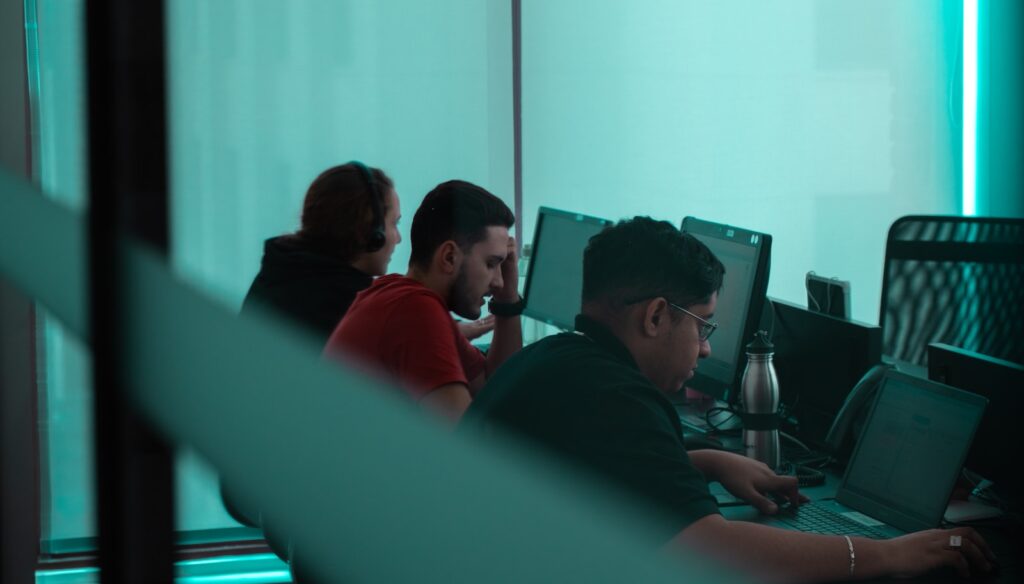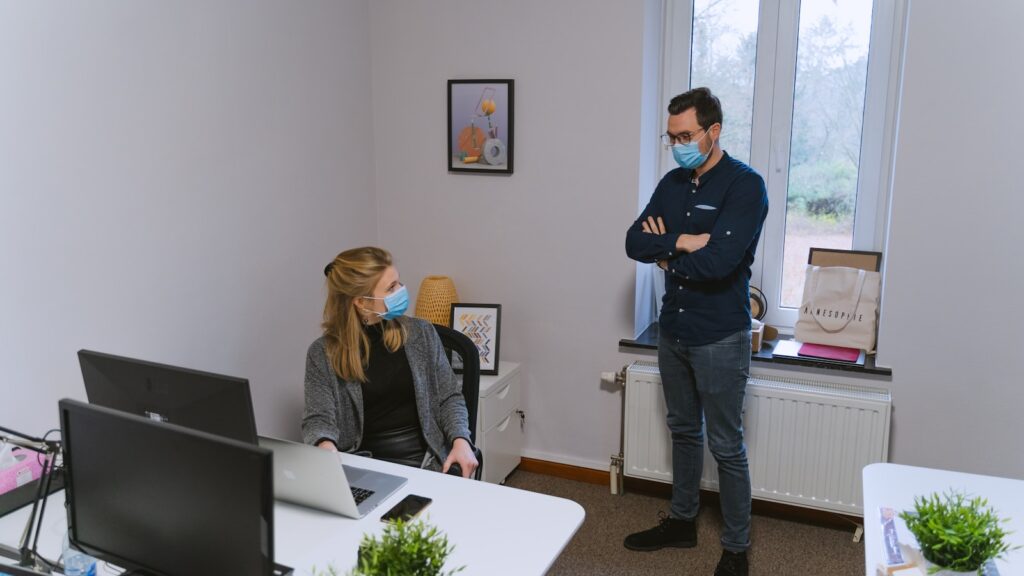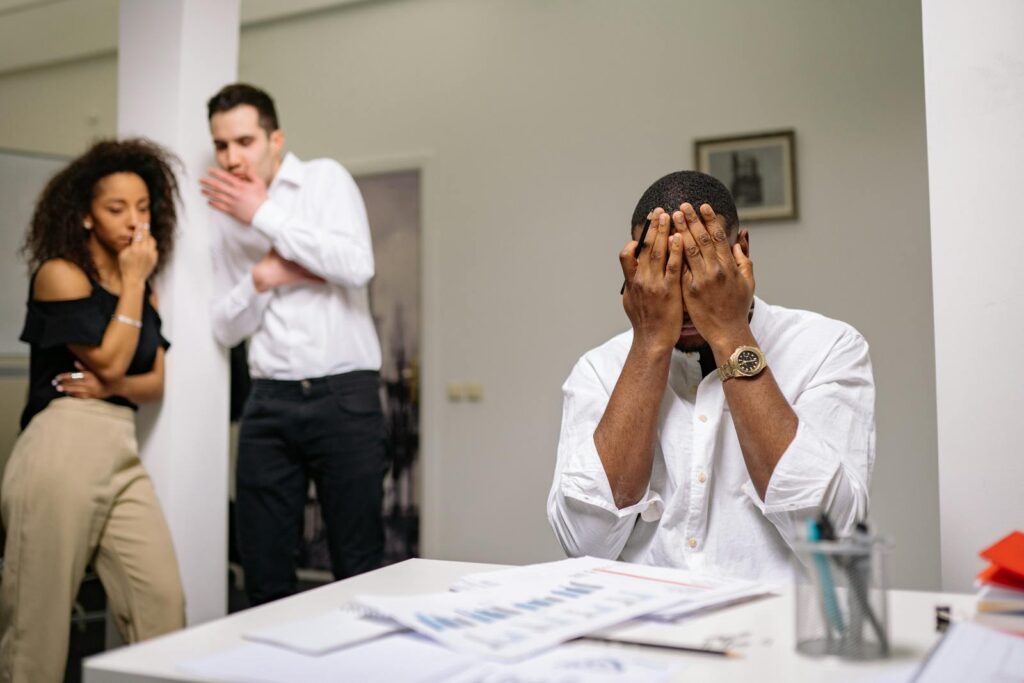
Work should challenge you, not drain the life out of you. Toxicity doesn’t walk in the door shouting its name. It hides in the way people speak, the weight of silence and the air you breathe in meetings. Some signs look small, easy to dismiss. Together they build a picture. If you’re feeling smaller every day instead of stronger, the place may be poisoning more than just your schedule.
People Whisper More Than They Talk

The hallway feels like it has ears. Colleagues huddle near the printer, voices low, glances sharp. Conversations stop when certain people walk by. Gossip is one thing; fear of being overheard is another. If the workplace runs more on whispers than open discussion, it’s not communication—it’s survival. And survival isn’t how a team should function. The louder the whispers, the clearer the message: people don’t feel safe speaking plainly.
Recognition Never Shows Up

Hard work usually leaves traces. A quick thank you, a nod in a meeting, maybe an email of acknowledgment. In toxic workplaces, you give hours, nights, weekends, and silence is all that greets you. Or worse, someone else’s name is pinned to your effort. That erosion of recognition feels small at first. Over time, it convinces you nothing matters. People don’t stop trying because they’re lazy; they stop because they’re invisible.
Turnover Never Slows Down

You start keeping track without meaning to. Another goodbye cake, another desk cleared. Faces change faster than projects finish. When the best people leave and the worst stay rooted, the pattern explains itself. It’s not the industry, not the season not the economy. It’s the air inside the building. High turnover is the loudest silent alarm a workplace can send. Ignore it too long and you’ll be the one leaving next.
Sunday Dread Creeps Earlier

Mondays don’t just start at nine. They start on Sunday, sometimes even Saturday night, when your stomach tightens and the thought of logging in steals your weekend. That creeping dread means the place isn’t just stressful—it’s leaking into your life. A job can be demanding and still leave you free when you clock out. When anxiety starts before the workweek, the workplace has already climbed into your home.
Mistakes Mean Punishment

Everyone makes errors. In healthy workplaces, they become lessons. In toxic ones, they turn into weapons. A missed deadline or small slip becomes public spectacle. You stop taking risks, stop speaking up and stop trying new things. Fear of failure replaces curiosity. And once fear takes root, growth dies. The measure of a workplace isn’t what happens when things go right—it’s how they treat you when things go wrong.
Favoritism Runs the Show

It’s not the best idea that wins. It’s who brought it up. Projects, promotions, opportunities—handed to the same circle over and over. You can spot it in meetings: the boss leans in for one person’s thoughts while skipping over another entirely. Merit loses power, and frustration spreads like smoke. When favoritism runs the show, talent leaves, resentment stays, and the system rots from inside out.
Boundaries Are a Joke

The midnight email. The “quick call” during vacation. The guilt trip when you leave on time. Workplaces that blur the line between job and life don’t just want effort—they want ownership of you. People convince themselves it’s temporary, just this project, just this season. Then years pass, and you’re still answering phones at dinner. Healthy boundaries aren’t selfish. They’re survival. If your job doesn’t respect that, it’s already toxic.
Honesty Goes Silent Around Leaders

You hear it in the switch of tone. Leaders walk in, and the room changes. Jokes stop, truths get softened, complaints vanish. No one risks saying what they actually think, because the cost is too high. Leadership may believe everything’s fine, but that’s the illusion fear creates. A team that cannot speak honestly to those in charge isn’t being managed—it’s being muzzled. And nothing good grows under silence.
Faces Look Drained

You don’t need a survey to know. Just look around the office, the Zoom squares, the cafeteria line. Slumped shoulders, flat voices, eyes glazed over before noon. Toxicity is visible in people’s bodies. It drains posture, tone, even the way someone walks back from a meeting. One or two bad days are normal. A whole room of them, every week? That’s culture speaking louder than any company values statement.
Burnout Hits the Best First

Watch the top performers. They carry double loads, fill the gaps, and get leaned on harder every quarter. In toxic places, they burn fast. The star player becomes the first one sick, the first to quit, the first to say “I can’t anymore.” When strong employees crumble, it’s not their weakness. It’s the system bleeding them dry. If the best can’t last, the problem isn’t individual—it’s structural.
No One Takes Real Breaks

Lunch disappears at the desk. Coffee gets reheated three times before anyone finishes it. Vacations still include “just a quick login.” In cultures that glorify constant grind, rest becomes guilt instead of right. You can see it in the way people brag about exhaustion like it’s a badge. But there’s nothing noble about burnout. A healthy workplace pushes you to pause. A toxic one pushes until you collapse.
Conversations Feel Like Battles

Meetings don’t feel like teamwork. They feel like duels. People cut each other off, raise voices, and rush to be the one who owns the point. Collaboration gets swallowed by competition. When every exchange feels like guarding territory, trust evaporates. Some walk away silent, others louder, but no one leaves aligned. If conversations always end with bruises instead of ideas, the culture isn’t collaborative—it’s combative.
Rumors Beat Facts

When leadership doesn’t share clearly, the rumor mill fills in the blanks. Whispers about layoffs, mergers and secret plans travel faster than any official update. People spend more time guessing than working. In healthy places, truth travels first. In toxic ones, it arrives last. By then, morale is already gone. Information shouldn’t be gossip’s side project. It should be the foundation.
Respect Is One-Sided

You’re expected to listen, obey and nod politely. In return, your concerns are dismissed, your feedback ignored, sometimes mocked. Respect flows upward, never down. Leaders talk at, not with. Peers take advantage because no one stops them. The absence of mutual respect corrodes slowly, but once it’s gone, it’s nearly impossible to rebuild. Respect is the bare minimum of a workplace. Without it, you’re just surviving, not working.
You Feel Yourself Shrinking

The clearest sign is the quietest. You walk in taller at first, and little by little, you stoop. Doubts creep in, your voice gets softer, your confidence slips. You start second-guessing every move, shrinking your own ideas before anyone else can. Work is supposed to stretch you, not reduce you. If the job makes you feel smaller with every passing week, the toxicity has already taken root.

